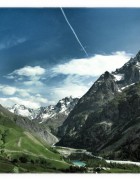It’s pretty hard to follow what is going on in Syria, and to a large extent the world’s media has moved on from the story, despite continued conflict and casualties.
However, a couple of reports from the Guardian recently outlined the increasing impact of oil resources on the conflict.
In the city of Shaddadi, just south of the Kurdish controlled oil region & the city of al Hasakah, the al-Qaida affiliated al-Nusra front control the oil-fields and operate primitive refineries. They are, allegedly, doing a good job of winning hearts and minds by providing security, wheat, and energy. They appear to be running the city along islamist socialist lines, with free clinics, electricity, and bread provision for the poor. An islamist commander known as the “emir of gas” runs the local gas plant, having thrown out representatives of the rebel Free Syrian Army.
<http://www.guardian.co.uk/world/2013/jul/10/syria-al-nusra-front-jihadi>
Further south, in the region of Deir al-Zor the control of al-Nusra is less clear. In a separate article the guardian describes Abu Zayed, the son of an eastern Syrian tribal leader, who has left Dubai, returning to Syria to reclaim his land. His vision is of an oil-fuelled emirate (pretty unlikely given Syria’s relatively spare oil resources).
The story describes chaotic infighting as rival groups respond to their own urgent need for fuel and the desire to own oilfields that might make 5m Syrian pounds ($50,000) a day selling gas, oil, and power to others. Each local tribe in the region claims any oilfields that they believe is in their wajeh (territory). Abu Zayed “owns” a gas plant and a gas to electricity power station (possibly the Omar station, which is 45km southwest of Deir al-Zor). This brings in 10m Syrian pounds ($100,000) a day by selling the gas and power to all comers. The government regime buys 5m cubic metres of gas a day so that they can fuel their own gas to electricity power plants. The liquid petroleum gas is given to al-Nusra to prevent any attacks, and is also sold to the local Free Syrian Army brigades and nearby tribes. The 120MW of electricity produced by the plant goes to rebel areas. A similar plant nearby, and the Jufra oil field, is controlled by al-Nusra directly. The gas grid that connects them both, and to the coastal cities is all controlled by the government. All in all, it’s quite a mess.
A local commander states “”Those oil lords, our version of warlords, they are the reason why we haven’t won yet. They don’t care if we all die here, they care about how much money they will make… They were with the regime and when they saw the regime collapsing decided to join the revolution. Now I don’t recognise them as part of the revolution. I only see those around me on the frontlines as the real revolutionaries. The rest – they are mercenaries and they will be eradicated after the war.”
<http://www.guardian.co.uk/world/2013/jun/25/syria-oil-assad-rebels-tribes>




Pingback: ISIS, Iraq, & Oil | The View from the Mountain